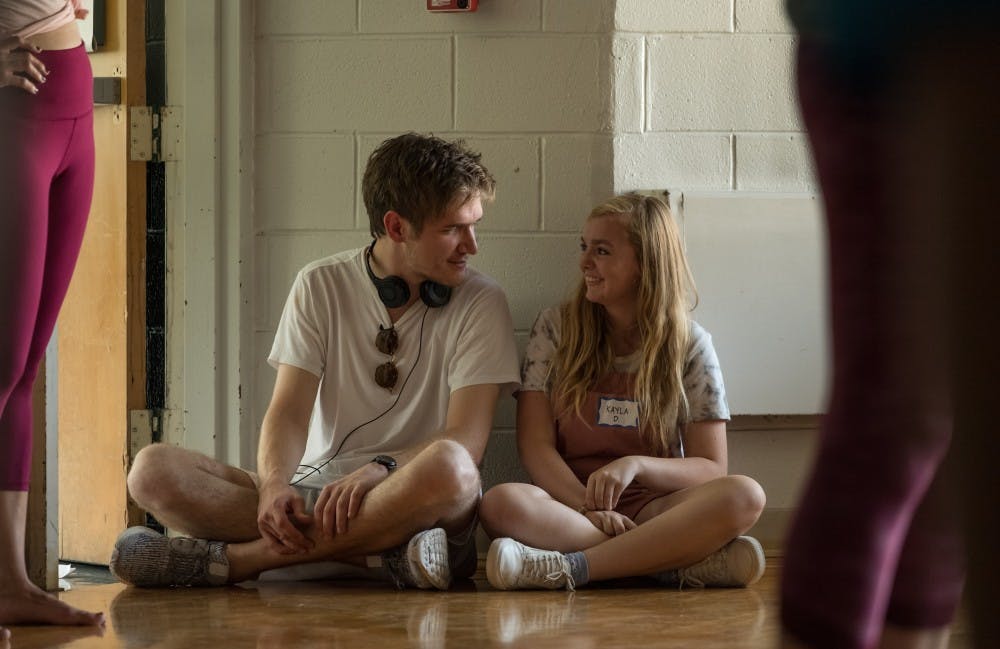“Eighth Grade” opens with an image of a screen, blurry with the resolution of a webcam. Kayla Day (Elsie Fisher) speaks directly to the camera. She stutters, punctuates each word with “like,” forcing the audience to sit through her awkwardness for an uncomfortable amount of time. The rest of the movie follows suit — it’s cringeworthy as can be, but that’s what makes this debut film from Bo Burnham so great.
Kayla isn’t the most popular girl in school. She doesn’t adhere to conventional beauty standards and struggles with social anxiety. She must navigate the confusion of coming-of-age in the context of middle school, a time and place notorious for its embarrassment and agony. To cope with her feelings of isolation and angst, Kayla records YouTube videos with life tips, like “how to gain more confidence” and “how to be yourself.” Each awkward, humiliating moment in real life is accompanied by a video with advice, which becomes more of a conversation with herself than with the viewers.
The brilliance of this film is not necessarily in the originality of the plot. The story of an awkward teen going through rites of passages for the first time is certainly not new, and “Eighth Grade” doesn’t deviate far from that predictable story. The magic of the film is how realistic and relevant the experiences of each character are.
I went into the movie skeptical of how accurate Burnham was going to get it; most teen movies are made by people who draw from their experience as a teenager decades ago, or perhaps from the way they see their children. This inevitably creates a caricature of adolescence, a hodgepodge of cliches and feigned references to internet culture that have long been dead. But the creation of the 28-year-old comedian Bo Burnham, who got his start on YouTube and Vine, feels much less patronizing and more rooted in the genuine experiences of young people. In an interview, Burnham said his choice to tell the story of an eighth grader was in part because he could relate to the experiences of anxiety and uncertainty many face at that age. He recalled 13-year-olds coming up to him after his stand-up shows thanking him for the way he perfectly portrayed the experience of anxiety. These experiences made him realize that there’s an eighth grader in all of us, and so this story must be shared.
The authenticity of the film is due in part to its portrayal of social media and technology. Unlike many other modern day movies, “Eighth Grade” doesn't take a stance on technology, and it isn't condescending toward teenagers. Rather, it shows the experiences of today’s youth as they actually are, without a political or analytical lens — just the disorganized, unglamorous life of a middle schooler in today’s messy world. In an interview on “Late Night with Seth Meyers,” Burnham said that the depiction of social media was intentional in that we shouldn’t place blame for the so-called ills of social media, but rather take “emotional inventory” once and a while.
“Eighth Grade” makes it easy to take this “emotional inventory” because the film sets up the viewer to be vulnerable. By including the long uncomfortable pauses, the silence between screen time, the experiences that usually don’t make the cut and the seemingly mundane moments that are usually overlooked, the film is able to capture the quieter moments of life that feel huge to the person experiencing them in the moment. The style of the film clearly isn’t made for anyone, it doesn’t consider the thoughts of film critics or tiptoe around the fourth wall, it simply seeks to capture Kayla’s mental state as realistically as possible.
One of the most groundbreaking aspects of “Eighth Grade” is its ability to capture the completely new experience of growing up today. In her TED Talk about the effects of social media, so-called “cyborg anthropologist” Amber Case made the point that today young people have to grow up online as well as in person, and that the maintenance of this “second self” is emotionally exhausting. Burnham’s film does an excellent job of portraying this simultaneity, which can induce apathy, passion, isolation, or connection, depending on how you use it.
“Eighth Grade” made me laugh, cry and cringe, sometimes at the same time. It made me think about being 13. It made me feel that very specific lump in my stomach. It made me reflect in a way that I hadn’t been forced to in a while. This low-budget film proved that impressive CGI and a recognizable cast isn’t what defines success at the box office; it’s just about how real a story is, how much it opens the hearts of viewers and helps them learn something new about themselves.
Get The Chronicle straight to your inbox
Signup for our weekly newsletter. Cancel at any time.

